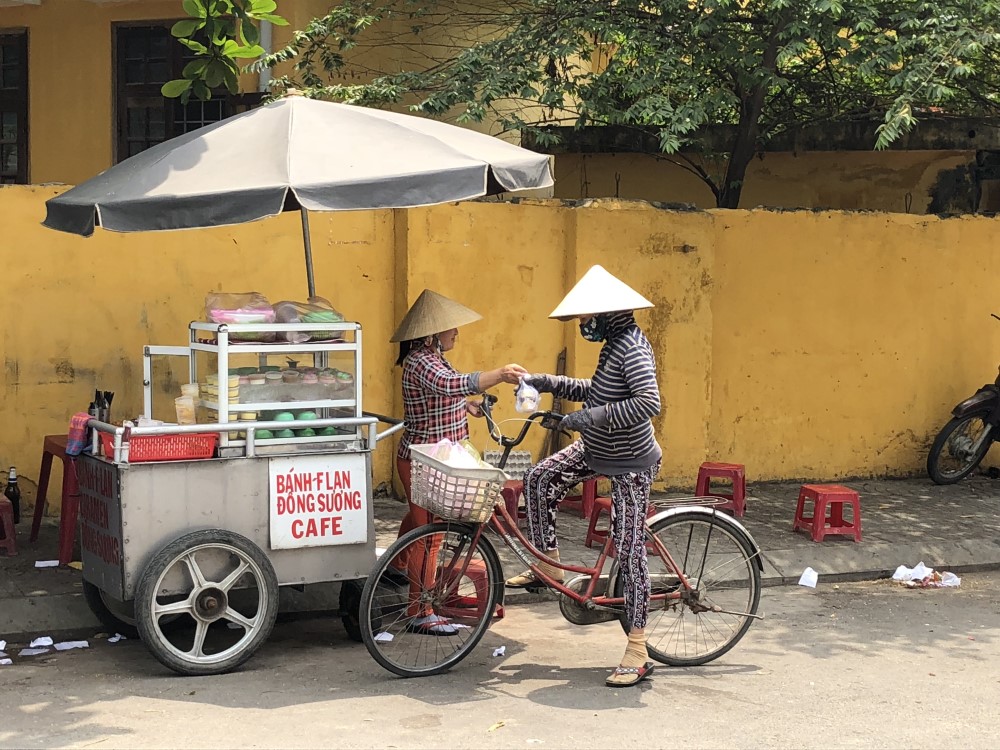Healthy and affordable food everywhere
People in low-income countries often have limited access to fruits and vegetables, which results in a one-sided diet. To make their eating habits more varied, Wageningen nutrition researchers lead an international study on food systems. In Nigeria, Ethiopia, Bangladesh and Vietnam, they investigate what interventions are needed in policy, communication and food supply. For example, by conducting experiments with sliced vegetables and nutrition guidelines.
The media focuses primarily on famine caused by drought, failed harvests and wars in poor countries. But a much more frequently occurring issue is malnutrition due to a one-sided diet, says food scientist Inge Brouwer. ‘A shortage of nutrients may occur if people live in a food desert, a region almost completely devoid of fresh produce. If healthy products are available, they are expensive or difficult to come by. This is the situation in the US and in rural parts of the Sahara.’
Moreover, the supply of unhealthy, processed food with high levels of fat and sugar increases everywhere. This food is often cheap but contains very few vitamins and minerals. ‘We see an increase in overweight in poorer countries as well’, Brouwer says. Legumes, vegetables and fruits are not always part of traditional eating patterns, which often consist mainly of carbohydrate-rich staples such as grains.
“To change food systems, strategies and policies must be developed at a regional, national and international level. We now understand better what this takes.”
The fact that the global food production centres on five staple crops (wheat, rice, corn, palm oil and soya) is not at all helpful. ‘Our policies and research everywhere are focused on the production of these five crops. With success, but ultimately causing the production of more nutrient-rich crops such as fruits and vegetables to fall back. While it is precisely these that are essential to a healthy diet.’
New tenet
Many projects and studies focus on food security and mitigating malnutrition. However, in recent years, many researchers and organisations have underscored the need for structural changes within the food system. The term food system refers to the interaction between governments, food producers, food sellers, consumers, and related businesses and organisations. ‘As a result of globalisation, food systems across the globe have become intertwined. We must, therefore, consider changes at a local, regional, national and international level.’
Brouwer leads and coordinates the Food systems for healthier diets flagship within the overarching research programme Agriculture for Nutrition and Health (A4NH) of CGIAR, an international alliance of agricultural research organisations. CGIAR has earmarked a 24-million-dollar budget for the Food systems for healthier diets flagship programme.
‘Most food systems approaches focus on food production. We focus on the consumer from a nutrition and health perspective and consider the food environment: the places where the consumers find food. That is an entirely different perspective.’
Nutrition guidelines
Brouwer and her colleagues at WUR and other knowledge institutes conduct studies in Nigeria, Ethiopia, Bangladesh and Vietnam. ‘It was quite a puzzle to figure out what countries had sufficient background information available but also differed sufficiently.’ The scientists study how different strategies and interventions work in a variety of contexts. ‘In Ethiopia and Vietnam, there is a strong government presence so that people can lean on the government. In Bangladesh and Nigeria, we work mainly with organisations and interest groups.

Next, the researchers determined what aspects of food systems are relevant from a healthy diet perspective and what roles governments, food producers, food suppliers and consumers may play. In collaboration with these parties, the researchers thus gained insight into the key bottlenecks and into what knowledge is still lacking.
‘This resulted in a knowledge roadmap for our research. It transpired, for example, that Ethiopia has no nutrition guidelines such as a food pyramid. These guidelines help the government decide what policies are needed to make the population’s eating habits healthier.’
Children’s videos and coupons
With the knowledge roadmap, the researchers started to fill in the gaps. ‘This was done in collaboration with local universities. We made small research grants available for master’s students. In Ethiopia in particular, the universities appreciated being able to contribute, and it yielded a lot of new knowledge.’
The researchers also investigate what networks focus on healthy eating patterns. ‘We discovered that the organisations within these networks were primarily concerned with sharing what they are doing, but are not yet developing and communicating a shared perspective’, Brouwer states.
Moreover, the researchers worked with local partner organisations to study the effects of a wide range of pilot projects. In Ethiopia, for example, a children’s video programme on healthy eating habits was developed. And in Nigeria and Vietnam, better strategies for presenting vegetables and fruits were developed in collaboration with food suppliers such as supermarkets. For example, a different set-up, or by handing out coupons.’
Vegetables on wheels
Veg-on-Wheels is a successful pilot that was conducted with the local university in the Nigerian city of Akure. ‘Convenience is a key factor in preparing and eating vegetables. During a busy working day, it is difficult to drive to the market and clean and slice fresh vegetables. Thus, cleaned, sliced, and packaged leafy vegetables were transported to work districts by bike trailer and sold there. This pilot was so successful that the method was adopted in Lagos and other Nigerian cities as well.’

Veg-on-Wheels is a successful pilot that was conducted with the local university in the Nigerian city of Akure.
Brouwer and her colleagues have seen countless interventions that cause smaller or greater changes in the food system. ‘These are, however, pilots. We do not yet know if they will also work if they are scaled up or applied within a different context.’
Because food systems are so complex, changes are only possible through an integrated approach, Brouwer stresses. ‘If you strive for better public health and set your goals accordingly, you must also take trade-offs into account. There are disadvantages. The cultivation of vegetables and fruits requires more water, land and pesticides than the cultivation of staple crops. Pesticides may have adverse effects on food safety, and increased irrigation can lead to an increase in mosquitos and thus, malaria.’
To include all these aspects, A4NH works with researchers from different disciplines who have expertise in nutrition, health, governance, transitions, production systems, food systems and consumers in developing countries.
Follow-up study
The A4NH programme has embarked on the last of its five years, but there will be a follow-up. ‘The corona pandemic has slowed down our work but has also clarified many issues. This means we have an opportunity to build back some aspects of food systems better, Brouwer says.
‘We may have started off with an oversimplified view on changes in the food system. To change food systems, strategies and policies must be developed at a regional, national and international level. We now understand better what this takes. This is knowledge we can apply in the follow-up study.’
Read more:
- Interview with Inge Brouwer on the A4NH research programme
- Routes towards sustainable, healthy and fair food systems
- A view on the Dutch food system in 2050
- Fighting the food crisis during and after corona
- Free online course (MOOC) on nutrition, nutrients and health (English)
- On food systems
- Video in which Inge Brouwer discusses food systems and healthier eating patterns
- Project Food Systems for Healthier Diets
- Read this article in Dutch


As a junior researcher and just-concluding doctoral student, I am fascinated with the grassroot work done in Akure, Nigeria, on ‘Veg on wheels’ as an innovative way of making fruits and vegetables available to the local populations.
Our research at the Institute of Agricultural Engineering (Tropics and Subtropics) on cassava foam mat drying and nutrition-related properties at the University of Hohenheim, Germany, has contributed primarily to the reduction of total cyanogenic glucosides to near-zero values while retaining substantial proportions of total carotenoids in yellow-fleshed cassava, in addition to improving physicochemical/functional properties of the cassava. However, we are still looking for ways to implement these research findings in our local populations in Nigeria. Therefore, your work is an inspiration, and any possible collaborations under a relevant project to achieve this goal will be much welcomed!
Regards.
I appreciate this research effort, However what are the basic fresh healthy farm products can be sold in Africa and what are the most economical ways to distribute them based on various models in Africa